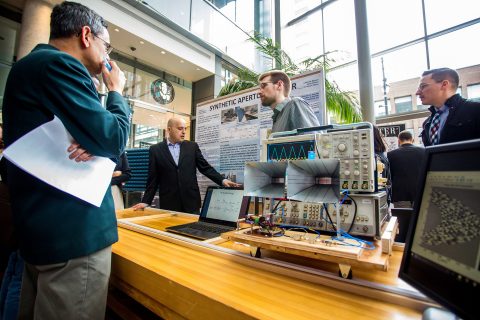Health and Life Sciences (BCompSc)
Virtual information sessions
Want to know how we're training the next generation of engineers and computer scientists? Join us to learn about the Gina Cody School's undergraduate programs and plans to advance integrated technologies in a socially responsible manner.
Why study Health and Life Sciences?
In our modern age of big data and data analytics, computer science is essential to unlocking the mysteries of human health and disease. Using the techniques and tools of high performance computing, machine learning and artificial intelligence, computer scientists and programmers have a crucial role to play in the rapidly expanding field of biomedical and health informatics.
The BCompSc in Health and Life Sciences will place you at the rich intersection of computer science and biology, providing a solid foundation in computer science while giving you the additional knowledge and skills to pursue a career or further studies in the health and life sciences. Our state-of-the-art labs for high-performance computing, networks and artificial intelligence will give you experience with the equipment you’ll use in the field. You’ll also:
- Develop algorithms for processing, visualizing and understanding biological and health data
- Design software for the health and life sciences sector
- Explore emerging software and hardware technologies in the context of health and life sciences
- Learn about molecular and cell biology, genomics and biological data sciences
Students who are more interested in studying these issues with a foundation in biology may wish to consider the BSc in Systems and Information Biology.
Program highlights
- The student-run Software Engineering and Computer Science Student Society (SCS) organizes coding nights, algorithm practice, tutorials, social events, and networking opportunities.
Special funding for out-of-province students
Up to $4000 for undergraduate programs.
Program structure
A Bachelor of Computer Science degree takes a minimum of three or four years (90 – 120 credits) of full-time study, depending on your academic background.
The core provides a basic and broad study of theory, mathematical basics, programming methodology, computer architecture, data structures, operating systems, and software engineering.
Program options
New students apply for admission to the Bachelor of Computer Science degree in Health and Life Sciences. Once you have completed 30 credits, you may apply to the Honours program.
Courses
Co-op program
The Co-op program gives you the chance to complete paid work terms that last 12 to 16 weeks.
Admission criteria
Minimum cut-off averages and course requirements for admission
- Quebec CEGEP: 27 overall, 26 math, 25 science
- Natural Science DEC or
- DEC intégré en sciences, lettres et arts or
- Linear Algebra; Calculus 1 & 2; Mechanics, Electricity and Magnetism; Waves, Optics and Modern Physics; General Chemistry; Chemistry of Solutions and General Biology
- Additional information for CEGEP applicants
- High school: A- overall, A- in math, B+ in science
- Canadian curricula course requirements
- Accepted international qualifications
- One math from Pre-Calculus, Calculus, or equivalent
- Two sciences (from Biology, Chemistry or Physics)
- ACT or SAT is not required
- AP exams are not required but may qualify you for advanced standing
- International Baccalaureate (IB) diploma: 33 overall, 5 HL or 6 SL math and 5 physics
- one math (Applications and Interpretations HL, Analysis and Approaches HL or Analysis and Approaches SL)
- one science (Physics, Chemistry or Biology, either SL or HL)
- one of the math or science courses must be completed at the HL level
- International Baccalaureate Career-related Programme (CP): 33 overall, 5 HL or 6 SL math and 5 physics
- Same as International Baccalaureate Diploma Programme (DP) requirements
- Additional Career-related Programme (CP) course requirements
- Baccalauréat français: 15 overall, 15 in math, 14 in science
- Première: Spécialité mathématiques and Spécialité physique-chimie
- Terminale: Spécialité mathématiques (also accepted, Spécialité Physique-Chimie and Mathématiques Complémentaires)
- Additional information for Baccalauréat français applicants
- British system of education (GCE):
- A-levels: At least two A-level exams AB, A in math, B in physics or
- AS-levels: At least 4 AS-level exams with equivalent results or
- BTEC: Level 3 Diploma or Extended Diploma in a related subject area with equivalent results
- Students without math or science A-levels may be admissible based on AS-level or iGCSE/GCSE/O-Level exam results. Students should include all their exam results from iGCSE (or equivalent) onwards to support their application.
- Additional information for British System of Education (GCE) applicants
- University transfers (internal): 3.0 overall, 3.0 in math and science, 2.3 in courses offered by the Gina Cody School of Engineering and Computer Science
- At least two of the following (or equivalent): MATH 203, 204, 205
- University transfers (external): A- overall, A- math, B+ science
- Courses in the disciplines of Calculus, Linear Algebra, Biology, Chemistry and Physics
- Applicants who do not meet the minimum entry requirements are encouraged to apply and may still be considered for admission, provided they have completed the majority of the prerequisite courses. Transfer credits may be considered on a course-by-course basis.
Minimum cut-off averages should be used as indicators. The cut-off data may change depending on the applicant pool. Applicants who meet the stated minimum requirements are not guaranteed admission to these programs.
Application deadlines
It’s not too late to apply
Most undergraduate programs are still accepting applications for fall 2025.

FALL ENTRY (September)
Deadline: March 1
International applicants: Apply no later than February 1 to allow time for immigration document processing. However, applying earlier is strongly recommended. Immigration processing times vary by country, and delays could prevent you from starting your studies on time.

WINTER ENTRY (January)
Deadline: November 1
International applicants: Apply no later than August 1 to allow time for immigration document processing. However, applying earlier is strongly recommended. Immigration processing times vary by country, and delays could prevent you from starting your studies on time.
We reserve the right to close admission to a program at any time after the official deadline without prior notice.
Funding note
Quebec residents who enroll in certain programs and meet the eligibility criteria may apply for funding of $2,500 per term through the Quebec Perspective Bursary (Bourse Perspective Quebec).
United States students: A U.S. Federal Student Aid-eligible version of this program is offered. This version meets all U.S. regulations (such as no co-operative education or e-courses) for eligible programs.
After your degree
The BCompSc in Health and Life Sciences will prepare you for a career in biotechnology, as well as for additional graduate training in computer science and health-related disciplines, such as:
- Bioinformatics
- Medical research
- Pharmacology
Student story

Doris Oh
Bachelor of Engineering Option: Civil Infrastructure (Co-op)
There are plenty of opportunities to follow your curiosity in the Gina Cody School of Engineering and Computer Science, where Doris Oh dives into her first internship through Co-op.
Other programs of interest

Studying Systems and Information Biology will place you at the rich intersection of biology and computer science.
Department
Faculty

The Computer Applications option gives doubly passionate students the flexibility to combine a traditional computer science degree and with a non-traditional field. Though many students complete a Major in Computation Arts or a Major in Mathematics and Statistics, students may declare a major or minor in any area outside the Faculty of Engineering and Computer Science.
Department
Department of Computer Science and Software Engineering
Faculty

Design, code, and test software products – with the big picture in mind. Think financial software, airline ticketing systems or information databases. As a software engineer, your expertise in analog/digital signal processing, microprocessors, microwaves and fibre optics will give you the tools to tackle these challenges everyday.
Department
Department of Computer Science and Software Engineering
Faculty


